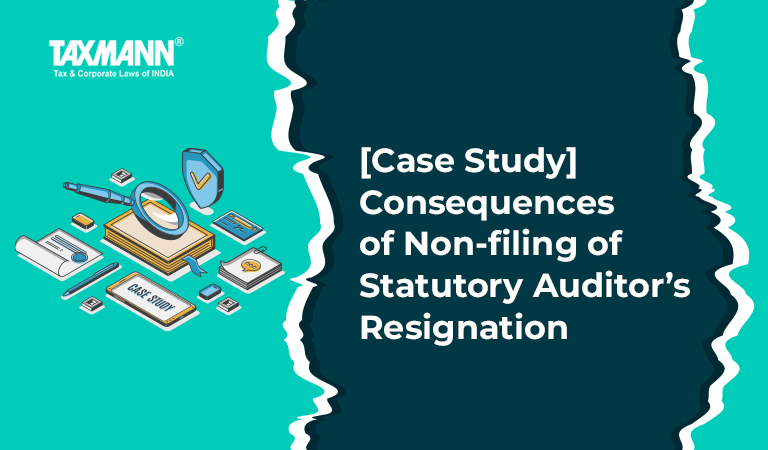[Case Study] Consequences of Non-filing of Statutory Auditor’s Resignation
- News|Blog|Company Law|
- 2 Min Read
- By Taxmann
- |
- Last Updated on 28 May, 2022

[2022] 138 taxmann.com 458 (Article)
Statutory auditor’s appointment
Any individual trained to review and verify accounting data and recognised as a Chartered Accountant (CA) under the Chartered Accountant Act, 1949 is deemed to be an auditor. Every company needs to appoint an auditor as per the provisions of the Companies Act, 2013. The companies can appoint an individual chartered accountant or a firm of chartered accountants as its auditors. In case of appointment as a firm as an auditor, the partner of the firm would be signing the audit report on behalf of the firm.
Purpose of appointment of auditor
The purpose of appointing an auditor in a company is to protect the interests of the shareholders. The auditor is obligated and mandated by law to examine the books of account maintained by the company and inform the shareholders of the true financial position of the company. Auditor gives his independent opinion to the owners i.e. the shareholders of the company to protect and keep the company in a safe financial condition.
Procedure of appointment of auditors in a company
In case of listed companies, public and private companies the first auditor of the company, immediately after the incorporation of the company is done by the board of directors of the company within a period of 30 days from the date of incorporation. Registration. The appointed auditors would hold the office of the auditors till the conclusion of the first annual general meeting of the company.
Appointment of subsequent auditors
At the first annual general of the company, with a written consent and the required eligibility certificate from the auditor, the appointment of auditor is done by the members and the auditors so appointed will hold office till the end of the 6th annual general meeting (i.e. for a period of five years). The appointment shall be in accordance with the provisions of the Companies Act, 2013 relating to the appointment conditions laid down by the auditor and the appointment is made pursuant to section 139 of the Companies Act, 2013.
Resignation of the auditor and the compliance requirement
The auditor appointed in the company under section 139 of the Companies Act, 2013 can also resign if the auditor wants to resign from his post and the auditors is mandatorily by law required to intimate the Registrar of the Companies by filing the prescribed form ADT-3 within 30 days from the date of resignation. The requirement of filing the form ADT-3 is pursuant to section 140(2) of the Companies Act, 2013 read with Rule 8 of the Companies (Audit and Auditors) Rules 2014. The relevant provisions is given below for ready reference.
Click Here To Read The Full Article
Disclaimer: The content/information published on the website is only for general information of the user and shall not be construed as legal advice. While the Taxmann has exercised reasonable efforts to ensure the veracity of information/content published, Taxmann shall be under no liability in any manner whatsoever for incorrect information, if any.

Taxmann Publications has a dedicated in-house Research & Editorial Team. This team consists of a team of Chartered Accountants, Company Secretaries, and Lawyers. This team works under the guidance and supervision of editor-in-chief Mr Rakesh Bhargava.
The Research and Editorial Team is responsible for developing reliable and accurate content for the readers. The team follows the six-sigma approach to achieve the benchmark of zero error in its publications and research platforms. The team ensures that the following publication guidelines are thoroughly followed while developing the content:
- The statutory material is obtained only from the authorized and reliable sources
- All the latest developments in the judicial and legislative fields are covered
- Prepare the analytical write-ups on current, controversial, and important issues to help the readers to understand the concept and its implications
- Every content published by Taxmann is complete, accurate and lucid
- All evidence-based statements are supported with proper reference to Section, Circular No., Notification No. or citations
- The golden rules of grammar, style and consistency are thoroughly followed
- Font and size that’s easy to read and remain consistent across all imprint and digital publications are applied



 CA | CS | CMA
CA | CS | CMA
